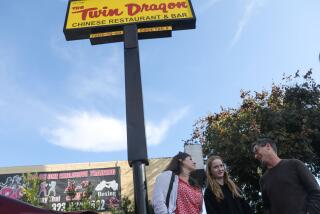CHINA : Santa Claus Is Coming to a Town Called Beijing
- Share via
BEIJING — A radio station in the Chinese capital airs advertisements for a giant new market, Warehouse Shopping City, to the strains of “O Little Town of Bethlehem.”
On the western edge of the city, customers line up to buy gaily decorated Christmas cards at the small San Li He street market.
In Shanghai, thin young men in ill-fitting Santa costumes pass out candy at the entrances of the Shanghai Orient Shopping Center.
“Businesses in Shanghai are paying more and more attention to Christmas,” mall manager Wu Weisong said. “It gives a big boost to our sales.”
Yes, Virginia, there is a Sino Claus.
Following the pattern set by Japan, Thailand and other non-Christian Asian countries, the People’s Republic of China has gotten into the mercantile spirit of the Christmas season in a big way.
Key shopping streets in major cities are festooned with Christmas decorations of all kinds. A shop on Beijing’s fashionable Wangfujing Street offers “Wholesale Tree Decorations and Party Toys for Christmas.” The upscale Zhong Xiang Tai Fu Jewelry Co. is decked to the halls with Christmas kitsch and offers a 15% holiday discount.
The Chinese government is quick to downplay the religious significance of the Christmas craze. Celebration of foreign holidays is officially proscribed in all schools and public institutions. The state religion is still atheism.
On the other hand, the government recognizes and even welcomes the recent Christmas trend as a sign of economic maturity.
“In recent years,” said Duan Qiming, a spokesman for the religious affairs bureau of the State Council, “younger people seem more interested in spending time and money on Christmas. That’s not because they have religious belief. They just see it as an attractive part of Western culture.”
The view among many Chinese is that their country already makes more than half of the world’s toys and most of its Christmas lights, ornaments, wreathes and artificial trees. Why shouldn’t China join in the holiday fun?
“It started after 1985, and it gets bigger and bigger each year,” said a government bureaucrat in her late 30s. She said many couples now exchange presents.
This year, even some Chinese government ministries joined in the Christmas card game. The foreign affairs office of the Beijing city government sent a bright red card with a gilded picture of the Great Wall of China with its “Merry Christmas” greeting.
The State Council sent a red card that contained a compact disc of songs. But none of the titles, which included “Fernleaf Hedge Bamboos under the Moon” and “Kangding Love Song,” had much of a Christmas lilt.
Attendance at Christmas services was high last year, with more than 40,000 people attending Latin Mass at Beijing’s 14 Catholic Churches.
But for most Chinese, Christmas has no religious significance. Holiday music is often a year-round affair: One firm here has played “Jingle Bells” for customers on hold on its phone lines for more than two years.
The Chinese understanding of some of the holiday’s icons--Santa Claus, for example--also is less than complete. A young woman selling strawberry-, melon-, chocolate- and pineapple-flavored popcorn on Wangfujing Street pointed to a Santa Claus sticker pasted to the front of her popcorn machine.
“He’s the popcorn salesman,” she said smiling. “His bags are full of popcorn.”
Similarly, card-shoppers at San Li He market came up with these responses when asked: “Who is Santa Claus?”
Qian Fang, 18, a university freshman, said, “He is an old man who brings happiness.”
Ma Jingjian, 12, a middle school student, said: “Maybe he is real. He represents friendship.”
Ma Nin, 14, another middle school student, “I don’t believe he is real. He never gives me presents. We Chinese don’t have chimneys. How can he come in the house? Break in?”
And Dong Xulin, 35, a security guard, said, “I know him, but we Chinese don’t have Christmas.”
Bao Lei of The Times’ Shanghai Bureau contributed to this report.
More to Read
Sign up for Essential California
The most important California stories and recommendations in your inbox every morning.
You may occasionally receive promotional content from the Los Angeles Times.













